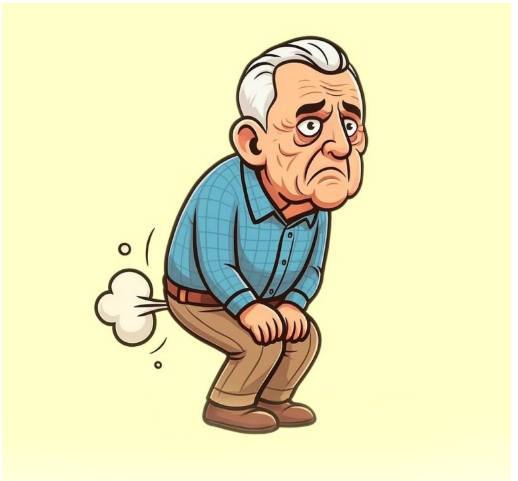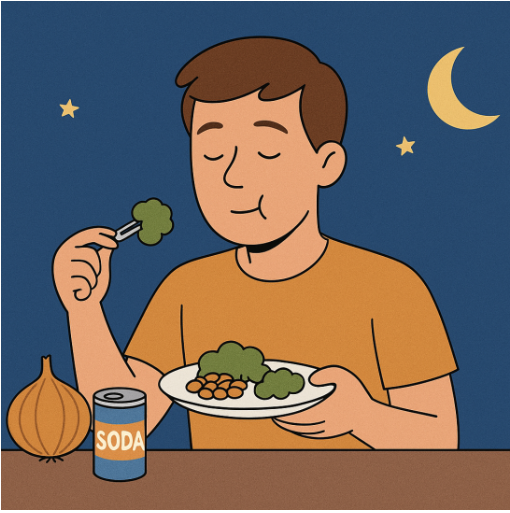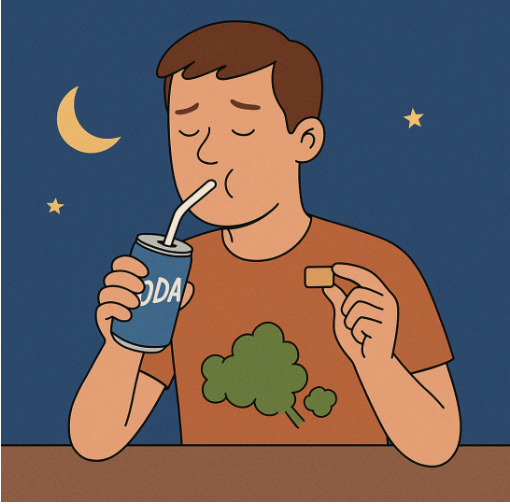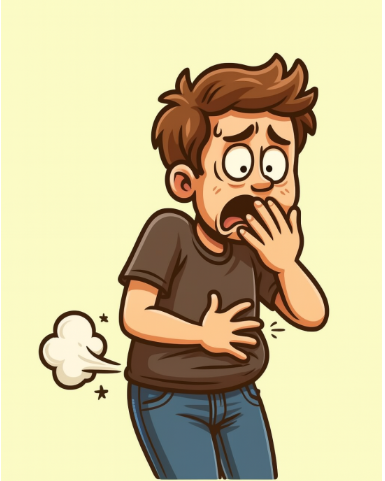Passing gas is a completely natural part of digestion, but if you nd yourself
excessively gassy—especially at night—it could be your body’s way of signaling
that something’s off. While a few nighttime toots are normal, constant or
excessive atulence may be linked to certain dietary habits, lifestyle choices, or
underlying health issues. Let’s break down what it might mean if you’re farting
too much in your sleep.

1. You’re Eating Gas-Producing Foods Late in the Day
Certain foods are notorious for causing gas, particularly when eaten in large
quantities or late at night. Common culprits include:
- Beans and lentils
- Cruciferous vegetables (broccoli, cabbage, Brussels sprouts)
- Onions and garlic
- Carbonated drinks
- Whole grains
- Articial sweeteners like sorbitol or xylitol
Why it matters: These foods ferment in your gut, producing gas. If you eat
them at dinner or as a late-night snack, the gas builds up while you sleep.

2. You’re Swallowing Too Much Air
You may be taking in extra air without realizing it, especially if you:
- Eat too quickly
- Drink through a straw
- Chew gum
- Smoke
Why it matters: Excess air doesn’t get absorbed—it has to come out one way
or another, and that often means more gas later, including during sleep.
3. You Might Have a Food Intolerance
Common food intolerances can trigger excess gas and bloating, especially at
night. These include:
- Lactose intolerance: Trouble digesting dairy
- Gluten sensitivity: Especially if you have celiac disease or non-celiac gluten
sensitivity - Fructose malabsorption: Difculty absorbing fruit sugars
Why it matters: Undigested food ferments in your intestines, causing gas,
which may increase when your digestive system slows down at night.

4. Your Gut Bacteria Might Be Off-Balance
Your gut is full of bacteria that help digest food. But an imbalance (called
dysbiosis) can lead to excessive gas production. This might be triggered by:
- Antibiotic use
- Poor diet
- Stress
Why it matters: An imbalance may lead to increased fermentation and gas
buildup, especially when your body is at rest.
5. You May Have a Digestive Condition
Sometimes excessive nighttime farting is a symptom of a more serious
condition, such as:
- Irritable Bowel Syndrome (IBS)
- Small Intestinal Bacterial Overgrowth (SIBO)
- Gastroesophageal Reux Disease (GERD)
- Inammatory Bowel Disease (Crohn’s or ulcerative colitis)
Why it matters: These conditions affect how your gut moves and processes
food, which can lead to gas retention and release during sleep.
6. You’re Not Moving Enough During the Day
Regular movement helps your digestive system process food and move gas
through the intestines. A sedentary lifestyle, especially in the evening, can slow
things down.
Why it matters: Lack of physical activity may mean your body isn’t expelling
gas efciently during the day, so it all builds up at night.

7. Your Sleep Position Plays a Role
Surprisingly, the way you sleep can inuence how much you fart at night.
Lying at on your back or right side may make it easier for gas to escape.
Why it matters: Gravity and muscle relaxation during sleep can allow trapped
gas to pass more freely.
What You Can Do About It
If nighttime atulence is bothering you or your partner, consider these tips:
- Avoid gas-producing foods at dinner
- Eat slowly and mindfully
- Cut down on carbonated drinks and chewing gum
- Limit dairy and gluten if you suspect an intolerance
- Get regular exercise
- Try probiotics to balance gut bacteria
- Keep a food diary to track triggers
If the issue persists, worsens, or is accompanied by other symptoms like
bloating, pain, or diarrhea, talk to a healthcare provider. Persistent gas could
be a sign of something more serious that requires medical attention.
Final Thoughts
Farting too much at night isn’t necessarily a cause for alarm—but it can be
your body’s way of asking you to take a closer look at your diet and digestion.
With a few simple adjustments, you may be able to quiet things down and get
a better night’s rest—for you and anyone sleeping next to you.


